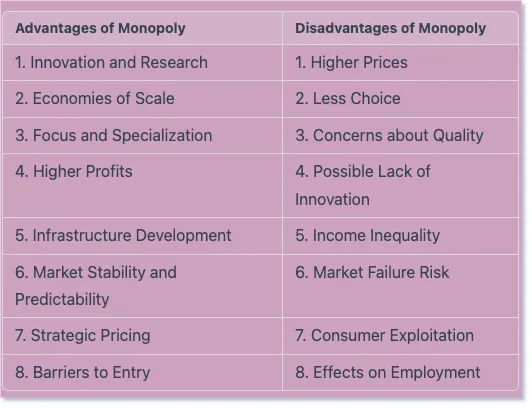Monopolies are market structures in which a single corporation or entity dominates the market for a certain product or service, with little competition. They may have a significant influence on the economy and customers, both positively and negatively. The following are the 8 advantages and disadvantages of monopoly which we will learn in this article.
Table of Contents
What are the Advantages and Disadvantages Of Monopoly?
When one company controls the supply of a certain good or service in a whole market, this is called a monopoly. The monopolist has a lot of power because they are in charge of setting costs and limiting competition.
It can make things more efficient and lead to new ideas, but it also makes people worry about buyer choice, market fairness, and possible economic problems. Knowing the advantages and disadvantages of monopoly can help you understand how they affect economies and customers in complex ways.
Advantages of Monopoly
Innovation and Research: Monopolies can put a lot of money into research and development because they have a big part of the market and make a lot of money. This leads to new ideas and improvements in technology.
Economies of Scale: Monopolies can cut costs by making a lot of the same thing. This lowers the average cost per unit, which could mean lower prices for customers.
Focus and Specialisation: Monopolies can focus on what they do best because they don’t have to worry about competition. This lets them make goods or services that are exactly what customers want.
Higher Profits: Monopolies can make a lot of money by controlling the market. These profits can be used to grow the business or given back to owners.
Infrastructure Development: Monopolies may spend money on building important infrastructure that makes services and goods better and easier to get.
Market stability and predictability: Because monopolies control the market, they offer market stability and predictability for customers and investors.
Strategic Pricing: Monopolies can use pricing strategies that might help customers by giving bundles or lowering prices in some market segments in order to make the most money overall.
Barriers to Entry: In some situations, a monopoly’s strong position and control of the market make it hard for new companies to enter. This keeps the market stable and stops it from fragmenting.
People also view: 6 Major Differences between Monopoly and Monopolistic Competition
Disadvantages of Monopoly
Higher Prices: Because customers don’t have any other choices, monopolies can set prices as high as they want to make the most money. This can cause prices to rise, which takes away from the buyer surplus.
Less Choice: When there isn’t any competition, customers don’t have many or any choices. Monopolies might not put a high value on providing a wide range of goods and services.
Concerns about quality: If there isn’t any competition, companies may not have as much of a reason to come up with new ideas or improve quality, which could lead to stagnation or lower-quality goods and services.
Possible Lack of Innovation: Because they have a monopoly on a market, some companies may get lazy and stop trying new things, which can slow down technology progress.
Income Inequality: Monopolies often give most of their profits to a small group of people or businesses, which makes income inequality worse in society.
Market Failure Risk: Monopolies can sometimes cause markets to fail because they are inefficient, there isn’t enough competition, or people abusing their market power, which hurts the economy as a whole.
Consumer Exploitation: Monopolies may take advantage of their market power to hurt consumers by selling bad goods or services without worrying about losing customers to other companies.
Effects on Employment: Monopolies may sometimes focus on ways to cut costs, which could mean fewer job chances or unfair labour practices.
Lets see the advantages and disadvantages of Monopoly in a Table for clear understanding:

Also View: Monopolistic Competition

